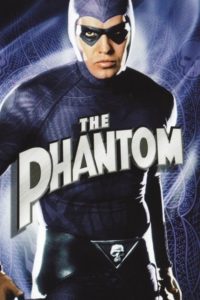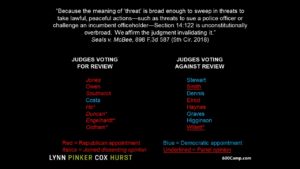 The dusky gopher frog returns to the Fifth Circuit; the Supreme Court has reversed a decision about judicial review of the Fish & Wildlife Service’s treatment of the endangered frog’s habitat, reached after a close denial of en banc review. In the meantime, the Fifth Circuit’s makeup has materially changed in ways that likely predispose the full court toward a different view of the underlying administrative-law issues.
The dusky gopher frog returns to the Fifth Circuit; the Supreme Court has reversed a decision about judicial review of the Fish & Wildlife Service’s treatment of the endangered frog’s habitat, reached after a close denial of en banc review. In the meantime, the Fifth Circuit’s makeup has materially changed in ways that likely predispose the full court toward a different view of the underlying administrative-law issues.
Monthly Archives: November 2018
 A gruesome series of automobile accidents led to a fundamental question about causation and insurance coverage in Evanston Ins. Co. v. Mid-Continent Casualty Co.: “Over a ten-minute period on November 15, 2013, the insured’s Mack truck struck (1) a Dodge Ram, (2) a Ford F150, (3) a Honda Accord, (4) a toll plaza, and (5) a Dodge Charger. . . . [T]he Mack truck’s primary insurer refused to contribute more than $1 million toward the settlements of the final three collisions, claiming that they were part of a single ‘accident’ under its policy.” Examining the reference points about this question under Texas law, the Fifth Circuit noted that:
A gruesome series of automobile accidents led to a fundamental question about causation and insurance coverage in Evanston Ins. Co. v. Mid-Continent Casualty Co.: “Over a ten-minute period on November 15, 2013, the insured’s Mack truck struck (1) a Dodge Ram, (2) a Ford F150, (3) a Honda Accord, (4) a toll plaza, and (5) a Dodge Charger. . . . [T]he Mack truck’s primary insurer refused to contribute more than $1 million toward the settlements of the final three collisions, claiming that they were part of a single ‘accident’ under its policy.” Examining the reference points about this question under Texas law, the Fifth Circuit noted that:
- Eight specific sales from one shipment of contaminated bird seed created eight separate occurrences;
- Two fires, set by the same arsonist “several blocks and at least two hours apart,” created two separate occurrences; and
- “[A]n HEB employee’s sexual abuse of two different children, a week apart, at an HEB store” created separate occurrences; however,
- A flawed three-hour crop dusting that damaged the land of several neighbors created one occurrence, even though “the plane had landed several times to refuel . . . [and] the temperature, wind, and altitude varied during the several passes over different sections of thee property”; and
- Two separate storms that damaged the same drilling rig created two separate occurrences.
Under the principles behind these cases, the Court found that the harm caused by the Mack truck’s driver created a single occurrence: “Absent any indication that the driver regained control of the truck or that his negligence was otherwise interrupted between collisions . . . all of the collisions resulted from the same continuous condition – the unbroken negligence of the Mack truck driver.” No. 17-20812 (Nov. 19, 2018).
 The Fifth Circuit noted that “[t]he parties agree that we have jurisdiction over this appeal” in Aggreko LLC v. Chartis Specialty Ins. Co., which arose from rulings on cross-motions for summary judgment in a dispute about insurance coverage. Unfortunately for the parties seeking appellate review, the Court also reminded that “we must sua sponte examine the basis of our own jurisdiction when necessary.” Here, the disposition on summary judgment below did not end the litigation, as it resolved only some claims between some parties, and did not expressly result in the dismissal or entry of relief with respect to any parties’ claims.” No. 18-40325 (Nov. 21, 2018).
The Fifth Circuit noted that “[t]he parties agree that we have jurisdiction over this appeal” in Aggreko LLC v. Chartis Specialty Ins. Co., which arose from rulings on cross-motions for summary judgment in a dispute about insurance coverage. Unfortunately for the parties seeking appellate review, the Court also reminded that “we must sua sponte examine the basis of our own jurisdiction when necessary.” Here, the disposition on summary judgment below did not end the litigation, as it resolved only some claims between some parties, and did not expressly result in the dismissal or entry of relief with respect to any parties’ claims.” No. 18-40325 (Nov. 21, 2018).
 In JCB, Inc. v. Horsburgh & Scott Co., the Fifth Circuit certified two questions of state law to the Texas Supreme Court, which involved important but sparsely-litigated topics about remedies under the Texas Sales Representative Act. The Court noted that “[o]n occasion, we have considered the following factors when deciding whether to certify: “(1) the closeness of the question and the existence of sufficient sources of state law; (2) the degree to which considerations of comity are relevant in light of the particular issue and case to be decided; and (3) practical limitations of the certification process: significant delay and possible inability to frame the issue so as to produce a helpful response on the part of the state court.” Two concurrences addressed potential answers that the Texas Supreme Court might provide. No. 17-51023 (Nov. 14, 2018).
In JCB, Inc. v. Horsburgh & Scott Co., the Fifth Circuit certified two questions of state law to the Texas Supreme Court, which involved important but sparsely-litigated topics about remedies under the Texas Sales Representative Act. The Court noted that “[o]n occasion, we have considered the following factors when deciding whether to certify: “(1) the closeness of the question and the existence of sufficient sources of state law; (2) the degree to which considerations of comity are relevant in light of the particular issue and case to be decided; and (3) practical limitations of the certification process: significant delay and possible inability to frame the issue so as to produce a helpful response on the part of the state court.” Two concurrences addressed potential answers that the Texas Supreme Court might provide. No. 17-51023 (Nov. 14, 2018).
 Three erotic dancers brought a First Amendment challenge to a Louisiana law that imposed a 21-year age minimum on that line of work. As to overbreadth (i.e., the coverage of the law), the Fifth Circuit found “no suggestion in this record that the legislature was seeking to affect dancers other than those at establishments in which erotic dancing was the norm, or . . . specifically intended to cover those at traditional theater and ballet.” As to vagueness, the Court observed that the dancers “want to wear the bare minimum, but the Constitution does not guarantee them that level of specificity.” Doe v. Landry, No. 17-30292 (Nov. 16, 2018, on rehearing) (emphasis added).
Three erotic dancers brought a First Amendment challenge to a Louisiana law that imposed a 21-year age minimum on that line of work. As to overbreadth (i.e., the coverage of the law), the Fifth Circuit found “no suggestion in this record that the legislature was seeking to affect dancers other than those at establishments in which erotic dancing was the norm, or . . . specifically intended to cover those at traditional theater and ballet.” As to vagueness, the Court observed that the dancers “want to wear the bare minimum, but the Constitution does not guarantee them that level of specificity.” Doe v. Landry, No. 17-30292 (Nov. 16, 2018, on rehearing) (emphasis added).
2018 has offered several close votes about en banc review, often showing the importance of the new Trump appointees to the overall makup of the Fifth Circuit. The Court recently voted to rehear en banc the case of Collins v. Mnuchin, an important administrative law dispute about the structure and authority of the Federal Housing Finance Agency (a regulator for Fannie Mae and Freddie Mac created by Congress after the 2008 financial crisis). The difficult issues produced three opinions by the panel members. The Court’s order requested supplemental briefing about, inter alia, the appropriate remedy if the Court concluded that the agency had a structural problem. The argument will be in January 2019 and should bring more insight about the direction of the modern Fifth Circuit. 
 Iberiabank v. Broussard, among many other issues, addressed the “century-old” uncalled witness rule, under which, “if a party has it peculiarly within his power to produce witnesses whose testimony would elucidate the transaction, the fact that he does not do it creates the presumption that the testimony, if produced, would be unfavorable.” Also, there is “an important exception to the applicability of
Iberiabank v. Broussard, among many other issues, addressed the “century-old” uncalled witness rule, under which, “if a party has it peculiarly within his power to produce witnesses whose testimony would elucidate the transaction, the fact that he does not do it creates the presumption that the testimony, if produced, would be unfavorable.” Also, there is “an important exception to the applicability of  the presumption: if the witness is ‘equally available’ to both parties, any negative inference from one party’s failure to call that witness is impermissible.” Here, the Fifth Circuit found that a witness with knowledge about a particular computer-access issue could have been called by either side, making this rule inapplicable. No. 17-30662 (Oct. 25, 2018).
the presumption: if the witness is ‘equally available’ to both parties, any negative inference from one party’s failure to call that witness is impermissible.” Here, the Fifth Circuit found that a witness with knowledge about a particular computer-access issue could have been called by either side, making this rule inapplicable. No. 17-30662 (Oct. 25, 2018).
 Despite the Trump Administration’s blazingly-hot pace for Fifth Circuit appointments, with five successful nominations before the midterm elections, the process of replacing Judge Jolly of Mississippi has lagged and the Court continues to have that one vacancy. Philip Thompson’s outstanding blog about Mississippi litigation recently had a detailed analysis of the political situation surrounding this vacancy.
Despite the Trump Administration’s blazingly-hot pace for Fifth Circuit appointments, with five successful nominations before the midterm elections, the process of replacing Judge Jolly of Mississippi has lagged and the Court continues to have that one vacancy. Philip Thompson’s outstanding blog about Mississippi litigation recently had a detailed analysis of the political situation surrounding this vacancy.
 Inadvertent calendaring errors can justify relief from some deadlines, but not Rule 60(b)(1), which says that a court “may relieve a party or its legal representative from a final judgment, order, or proceeding,” on the grounds of “mistake, inadvertence, surprise, or excusable neglect.” “A district court does not abuse its discretion when it denies a Rule 60(b)(1) motion due to the ‘careless mistake of counsel.’ In fact, our case law establishes the opposite: ‘a court would abuse its discretion if it were to reopen a case under Rule 60(b)(1) when the reason asserted as justifying relief is one attributable solely to counsel’s carelessness with or misapprehension of the law or the applicable rules of court.'” Rayford v. Karl Storz Endoscopy Am., Inc., No. 18-30602 (Oct. 23, 2018, unpublished) (citations omitted).
Inadvertent calendaring errors can justify relief from some deadlines, but not Rule 60(b)(1), which says that a court “may relieve a party or its legal representative from a final judgment, order, or proceeding,” on the grounds of “mistake, inadvertence, surprise, or excusable neglect.” “A district court does not abuse its discretion when it denies a Rule 60(b)(1) motion due to the ‘careless mistake of counsel.’ In fact, our case law establishes the opposite: ‘a court would abuse its discretion if it were to reopen a case under Rule 60(b)(1) when the reason asserted as justifying relief is one attributable solely to counsel’s carelessness with or misapprehension of the law or the applicable rules of court.'” Rayford v. Karl Storz Endoscopy Am., Inc., No. 18-30602 (Oct. 23, 2018, unpublished) (citations omitted).
 In an Erie guess based on prior Circuit precedent and intermediate Texas authority, this limitation-of-liability provision was found to not waive a claim for attorneys’ fees under CPRC § 38.001: “[E]ither Party’s liability, if any, for damages to the other Party for any cause whatsoever arising out of or related to this Agreement, and regardless of the form of the action, shall be limited to the damaged Party’s actual damages. Neither Party shall be liable for any indirect, incidental, punitive, exemplary, special or consequential damages of any kind whatsoever sustained as a result of a breach of this Agreement or any action, inaction, alleged tortuous conduct, or delay by the other party.” Ferrari v. Aetna Life Ins. Co., No. 17-20556 (Nov. 7, 2018, unpublished).
In an Erie guess based on prior Circuit precedent and intermediate Texas authority, this limitation-of-liability provision was found to not waive a claim for attorneys’ fees under CPRC § 38.001: “[E]ither Party’s liability, if any, for damages to the other Party for any cause whatsoever arising out of or related to this Agreement, and regardless of the form of the action, shall be limited to the damaged Party’s actual damages. Neither Party shall be liable for any indirect, incidental, punitive, exemplary, special or consequential damages of any kind whatsoever sustained as a result of a breach of this Agreement or any action, inaction, alleged tortuous conduct, or delay by the other party.” Ferrari v. Aetna Life Ins. Co., No. 17-20556 (Nov. 7, 2018, unpublished).
 Dubrow sued 2200 West Alabama Inc., alleging that Dubrow was the “rightful tenant” of space leased by 2200 West. Western World declined to defend the action, noting that its coverage only extended to claims about “[t]he wrongful eviction from, wrongful entry into, or invasion of the right of private occupancy of a . . . premises that a person occupies.” (emphasis added). While the meaning of “occupies” could be debated in the abstract, the term has a clear and unambiguous meaning under Texas case law, that “requires physical presence or possession.” Because Dubow never became a tenant, he never “occupied” the premises and coverage did not arise. 2200 West Alabama v. Western World Ins. Co., No. 17-20640 (Oct. 22, 2018).
Dubrow sued 2200 West Alabama Inc., alleging that Dubrow was the “rightful tenant” of space leased by 2200 West. Western World declined to defend the action, noting that its coverage only extended to claims about “[t]he wrongful eviction from, wrongful entry into, or invasion of the right of private occupancy of a . . . premises that a person occupies.” (emphasis added). While the meaning of “occupies” could be debated in the abstract, the term has a clear and unambiguous meaning under Texas case law, that “requires physical presence or possession.” Because Dubow never became a tenant, he never “occupied” the premises and coverage did not arise. 2200 West Alabama v. Western World Ins. Co., No. 17-20640 (Oct. 22, 2018).
 If you are a lawyer in the Dallas area, you should read today’s post on 600Commerce, about the new Democratic majority and Democratic Chief Justice on the Dallas Court of Appeals.
If you are a lawyer in the Dallas area, you should read today’s post on 600Commerce, about the new Democratic majority and Democratic Chief Justice on the Dallas Court of Appeals.
 Property rights are often called a “bundle of sticks”; a particularly tangled bundle was the subject of RPD Holdings LLC v. Tech Pharmacy Servcs. Careful examination of both sides’ specific obligations under a patent license led to the conclusion that it was an executory contract, rejected by operation of law during one of the parties’ Chapter 7 bankruptcy case. No. 17-11113 (Oct. 29, 2018).
Property rights are often called a “bundle of sticks”; a particularly tangled bundle was the subject of RPD Holdings LLC v. Tech Pharmacy Servcs. Careful examination of both sides’ specific obligations under a patent license led to the conclusion that it was an executory contract, rejected by operation of law during one of the parties’ Chapter 7 bankruptcy case. No. 17-11113 (Oct. 29, 2018).
 The issue in SCF Waxler Marine LLC v. Aris T MV was whether the excess insurers for a multi-vessel accident could enforce a “Crown Zellerbach clause,” and thus limit their liability to the value of the insured vessel. (The vessel at issue, the Aris T (right) is presently in the Atlantic en route to Rotterdam from Mobile.) The Fifth Circuit found that it lacked appellate jurisdiction over the district court’s ruling that the excess insurers could enforce such a clause: “The fundamentals of Bucher-Guyer bear a striking resemblance to this case. There, the district court determined the boundaries of a party’s liability— $500—based on the applicability of statutory language. Nevertheless, whether the opposing party was entitled to anything and, if so, how much was still to be determined. In this case, the court decided the boundaries of a party’s liability through determination of whether a contractual provision permitted them to do so. Whether Valero, Shell, and Motiva are legally permitted to recover anything from the Excess Insurers and, if so, how much remains to be determined.” No. 17-30805 (Oct. 30, 2018).
The issue in SCF Waxler Marine LLC v. Aris T MV was whether the excess insurers for a multi-vessel accident could enforce a “Crown Zellerbach clause,” and thus limit their liability to the value of the insured vessel. (The vessel at issue, the Aris T (right) is presently in the Atlantic en route to Rotterdam from Mobile.) The Fifth Circuit found that it lacked appellate jurisdiction over the district court’s ruling that the excess insurers could enforce such a clause: “The fundamentals of Bucher-Guyer bear a striking resemblance to this case. There, the district court determined the boundaries of a party’s liability— $500—based on the applicability of statutory language. Nevertheless, whether the opposing party was entitled to anything and, if so, how much was still to be determined. In this case, the court decided the boundaries of a party’s liability through determination of whether a contractual provision permitted them to do so. Whether Valero, Shell, and Motiva are legally permitted to recover anything from the Excess Insurers and, if so, how much remains to be determined.” No. 17-30805 (Oct. 30, 2018).
 William Pearson won a modest judgment in an overtime dispute and appealed in Pearson v. Frequency Car Audio, seeking more. The Fifth Circuit affirmed; as to a challenge to the accuracy of the employer’s records, it observed:
William Pearson won a modest judgment in an overtime dispute and appealed in Pearson v. Frequency Car Audio, seeking more. The Fifth Circuit affirmed; as to a challenge to the accuracy of the employer’s records, it observed:
“[T]he question before the district court was not whether Frequency kept proper records—it was whether Pearson worked overtime. And although the district court noted that Frequency’s books were “incomplete and not in evidence,” its conclusion that Pearson did not work overtime was based on its findings that: (1) Pearson’s claim that his work at Khalsa’s and Singh’s residences constituted work for Frequency was “incredible”; (2) Khalsa’s testimony that Pearson worked no overtime was credible; and (3) Pearson’s claim that he worked on cars before the shop opened was “unquantifiable.” Thus, the district court’s conclusion was largely based on the witnesses’ credibility, so we must give that conclusion due regard.”
No. 17-20769 (Nov. 2, 2018, unpublished) (emphasis added).
 A Fifth Circuit panel struck down a Louisiana criminal statute about “threats” in Seals v. McBee, which led to an 8-8 vote and denial of en banc review. The full breakdown appears in the chart to the right; again, the new appointments by President Trump brought a case to the cusp of en banc review that likely would not have gotten so far before. No. 17-30667 (Oct. 31, 2018). A dissent from the denial of en banc review, joined by 4 of the 5 Trump appointees, would have dismissed the case on standing grounds. (The chart has been corrected from the original post, which misidentified Judge Dennis as a Republican appointee.)
A Fifth Circuit panel struck down a Louisiana criminal statute about “threats” in Seals v. McBee, which led to an 8-8 vote and denial of en banc review. The full breakdown appears in the chart to the right; again, the new appointments by President Trump brought a case to the cusp of en banc review that likely would not have gotten so far before. No. 17-30667 (Oct. 31, 2018). A dissent from the denial of en banc review, joined by 4 of the 5 Trump appointees, would have dismissed the case on standing grounds. (The chart has been corrected from the original post, which misidentified Judge Dennis as a Republican appointee.)
